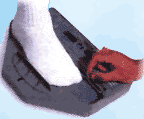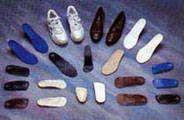
Mark Reed, DPM 714-528-FOOT
1275 Rose Drive Placentia, CA Suite 136
Melanie Reed, DPM 714-528-7777
1275 Rose Drive Placentia, Ca Suite 124
Podiatrists @ Placentia-Linda Foot & Ankle Group
WOMEN'S FASHION & ATHLETIC SHOE GUIDE
THE PERFECT FIT
Mark and Melanie Reed, DPM have been treating patients over 25 years. The most important podiatry factor in finding beautiful and comfortable
shoes is starting at a store that has knowledgeable sales professionals,
a good selection of quality shoes and a reasonable return policy.
When making your next shoe purchase, it is important to
discuss your shoe needs with the sales professional prior to
trying on any shoes. Our first choice in recommending a
shoe store that meets or exceeds our criteria is Nordstrom. Over the years, our patients
have had the best overall experience at these stores across the
country. Local running stores are also excellent for athletic shoes and especially motion control running shoes that are not sold at most big box sporting good stores.
THE JOURNEY OF A LIFETIME
Feet vary in shape as much as faces do. For the average man,
over a lifetime, a gradual increase in foot width and length
will occur. If a few years have passed since your feet
were last measured, you should not be surprised if your foot
length or width has increased.
SPECIAL SHOE SIZING
Forefoot width: When shoes are made, the forefoot width is made
to be proportional to the heel. For the man who needs a wide
forefoot compared to the heel, there are a number of shoe manufactures
that are now making these types of shoes that are called combination
lasts. Sometimes shoe stretching can also help make a shoe fit
better if a forefoot prominence is present. Unequal length: Certain
shoe manufactures will allow the shoe store to order mismatched
shoes. If one of your feet is longer than the other, you should
discuss your special sizing requirements with your sales professional.
Time of Day: Shopping in the afternoon is preferred to
account for any foot swelling that may occur.
FOOT MEASURING DEVICES
In using the measuring devices at the store, it is important
to keep n mind that shoe manufactures do not use these devices
in making their shoes. In addition, many shoe manufactures
vary their shoe size and it is very common today to find a size
10 that fits like a size 9 or vice versa.
BREAK -IN PERIOD
As a general rule, wear your new shoes for an hour at home while
making sure the shoes do not become soiled or scuffed. If
a painful area develops during the hour of wearing the shoes
at home, the shoes should be exchanged for a 1/2 size larger
or a different type of shoe.
 PROPER SHOE SIZING
PROPER SHOE SIZING
In trying on a pair of shoes, it is important to start the process
with the concept that the shoe will not conform to your foot
with time. Look for the following size characteristics
while standing in the shoes. Forefoot to Heel Length: The
widest part of your foot should match the widest part of the
shoe while standing in the shoes. This is important for
determining that the shoe flexes in the same place where the
ball of the foot flexes. Toe Box length: The toe box is
the correct length if there is at least one half inch beyond
the longest toe. The longest toe is not always the big
toe. Heel Width: The heel should not slip out of the shoe
when walking. Forefoot and Mid-foot Width: While standing,
the forefoot should not cause the shoe to bulge on the sides
and the material across the ball and the mid-foot area should
compress slightly between the fingers.
SHOE TYPE BASED ON
ACTIVITY
If the shoes are to be used with a lot of standing and walking
on hard surfaces, then the fashion shoes need to be designed
with this activity in mind. The best women's fashion shoes
for heavy activity are those shoes with Vibram light soles, leather
uppers and well padded insoles that are removable. These shoes allow
for a cushion insole to be added inside the shoe as well as a
functional shoe orthotic if required. For light business
activates, the standard leather soled fashion shoe with leather
uppers is suitable as long as it is accepted that the quarter
inch leather sole provides little to no shock absorption from
walking or standing on hard surfaces.
ATHLETIC SHOE CONSIDERATIONS
Few shoe manufactures for athletic shoes are made for a woman's
foot. Most athletic shoes for woman are just men's shoes with
a different color style. New Balance offers the best size and
width offerings for women athletic shoes. Saucony is a
favorite of women with a wide forefoot and an narrow heel.
Other manufactures that are starting to cater to a woman's foot
shape is Etonic, Nike, Reebok and Adidas. The recommended
shoes for those who need extra support are New Balance or Brook's Aerial motion control running shoes. Brooks and New
Balance offer the best size and width offerings for running shoes
where support is a concern. However, almost all shoe brands
have a motion control shoe in their line. The most important
factor for those looking for a supportive running shoe or walking
shoe is that the shoe is a "motion control" type of
shoe. Most shoe stores do not identify which shoes are
"motion control" and which are "stability"
or "cushioning" type of shoes. For a walking
shoe, purchase a "motion control" running shoe instead
of a general walking shoe. The "motion control"
running shoe will give much more support than a standard walking
shoe. Typically, the shoe that is sold at an athletic shoe
store is a "stability" type running shoe. A
"stability" type of shoe is for an average foot type
that does not have pronation problems or is "flattening
out". As such, due to the poor knowledge of most sale
people at athletic shoe stores, either you need to know what
you are looking for when you go to the store or you will need
to turn to the internet. An excellent source for shoe selection
is www.roadrunnersports.com.
 FOOT ORTHOTICS
FOOT ORTHOTICS
There are some women that need to use a dress foot orthotic to
help control the amount of foot motion in the shoe as well as
relieve pressure to certain areas of the foot. A foot orthotic
is actually a device that changes your foot's position in the
shoe and is usually made by a Podiatrist from a cast of
each foot. A women's dress orthotic is made to accommodate
the heel lift and the narrowness of a women's dress shoe. However,
some types of athletic foot orthotics will fit into a women's dress
shoe because the device is narrow in the heel area. If
a dress orthotic needs to be made, a dress device can be made
from the same cast that was used to make an athletic orthotic.
A good dress shoe for a dress orthotic would generally be a shoe that has less than 1 inch heel lift, is enclosed along the sides of the foot and the heel covers the entire heel area. The foot orthotic should fit inside the shoe so it touches the back of the shoe and causes no widening of the heel of the shoe. If a poor fit is noted with the foot orthotic and the shoe, either another shoe should be considered or the device should be returned to be narrowed by the laboratory.
Athletic foot orthotics are designed to control the motion of your foot in the shoe. However, the shoe must not collapse on the inside of the heel and forefoot areas when you are standing or running or the foot orthotic will do nothing in holding your foot correctly. Thus, this is why a "motion control" or "stability" type running shoe is required when wearing foot orthotics in an athletic shoe. In buying a new running shoe, the shoe should fit correctly and do not increase the size of the shoe because you wear foot orthotics. The way the foot orthotic should go into the running shoe is that the heel part of the insole that comes with the shoes should be cut out so the heel of the foot orthotic can sit on the bottom of the sole of the shoe. In cutting out the heel part of the insole that came with the shoe, the orthotic can then overlap the forefoot area so there is still cushioning for the ball of the foot. If the foot orthotic has an extension to the end of the toes, the entire insole that came with the athletic shoe can be removed.
Home -- About Us -- Services - Podiatry Topic Library -- Useful Podiatry Links -- New Patient Forms
Podiatrist Information on Foot Pain Topics including: Bunion Surgery Plantar Fasciitis Heel Pain Neuropathy Foot Orthotic Hammertoes Ingrown Toenail Neuroma Pain Running Injuries Wound Care Ankle Sprains Warts Fungus Toenails
Arthritic Foot Conditions Athlete's Foot Pediatric Growth Plate Pain Geriatric Foot Problems
Foot and Ankle Fractures Diabetic Foot Problems Callouses Metatarsal Stress Fracture
Offering Podiatric Surgery, Foot Surgery, Wound Care, Sports Medicine and Foot Orthotics,
Foot and Ankle Surgery and other treatments for Foot and Ankle Pain and Injuries.
Podiatry
and Foot related diagnostics and procedures are performed in Placentia / Yorba LInda, CA.
Podiatrists
Dr. Mark Reed and Dr. Melanie Reed
Placentia Linda Foot Ankle Group Podiatry Associates
Office of Mark Reed, DPM: 1275 N. Rose Drive, Suite 136 | Placentia, CA 92870 | Tel: 714-528-FOOT
Office of Melanie Reed, DPM: 1275 Rose Drive | Suite 124 | Placentia | CA 92870 | Tel: 714-528-7777
Yorba Linda Satellite Office: 21580Yorba LInda Blvd | Yorba Linda, CA 92887
www.footpain.org
Serving Placentia, CA and the surrounding North Orange County cities of Yorba Linda (92886, 92887), Brea (92821, 92822, 92823), Anaheim (92807, 90808), & Fullerton 92831, 92832, 92833, 92834, 92835 92836), Tustin (92780, 92781, 92783), and Orange (92861 92862 92865 92866 92867 92868 92869)